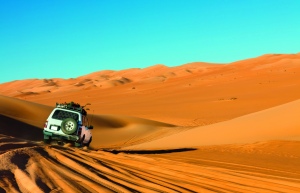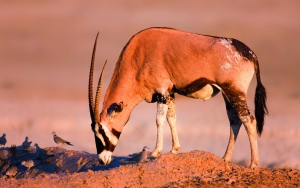Travel: Dr Cedric John and the Omani Desert
by Sam Wong

An answer to global warming might lie in the rocky outcrops of the desert in Oman. Imperial Magazine interviews Dr Cedric John.
I'm a geologist. I'm interested in rocks, so I tend to go where the rocks are. I go on about 10 trips a year, often to the Middle East as a large part of my activity is on Middle Eastern rocks that act as reservoirs for oil and gas.
We’re trying to understand how carbonate rocks, like those that store oil and gas, were formed, so that we can predict their characteristics under the surface. These rocks are deep underground in Qatar, but in Oman they’re at the surface where we can see them. They have tiny spaces inside, like a sponge, which can hold oil or gas. If you inject liquid carbon dioxide into them, that can also be trapped under the surface. We go to field locations, we measure things, we collect rock samples, we bring those samples back to London and we look at them in thin sections under a microscope. The composition of the rocks tells us something about their history.

Driving in the desert
The most remote places take three or four hours of off-tarmac driving to get to. To reach some of the outcrops you have to walk for several hours, so they can be quite long hikes but we always have GPS; we always tell the base team where we go and we never work alone, so we do take precautions.
Safety is obviously always important but when you work with an oil and gas company, they take that a step further. A logistics company provides 4x4s and they take care of everything. Their drivers are very experienced at driving in the desert. We always have spare cars in case something happens. We have a lot of water. We have satellite phones so we’re always in touch with the base. It’s actually quite luxurious in one sense.
Camping is one of the pleasures of doing fieldwork. It can get very cold at night. In some locations we’ve had frost at night. Then you go to 40 degrees during the day so it can be quite uncomfortable, but in general it’s not too bad. I go for a week or two weeks maximum but some of my PhD students have stayed for a month on location. The food when we’re camping is fantastic. We tend to put on weight rather than lose it while we’re away. We have a lot of Indian food because the cooks are all from India, and also Middle Eastern food. If there’s one thing we’re not lacking, it’s food.

Oryxes - Middle Eastern antelopes
The only thing that’s gone wrong was when we used to work in a wildlife reserve for oryxes — Middle Eastern antelopes. We had permission to work there but the government of Oman decided to close the reserve while one of my students was there, so she had to stay with the logistics team. Luckily we were able to find a different region to focus on at short notice.
I think the Qatar Carbonates and Carbon Storage project will have a serious impact. First, it’s a long-term effort, instead of being a piecemeal approach like some projects are, and it’s integrating disciplines across engineering and geology. The other reason is because the state of Qatar is serious about doing carbon capture and storage. You can really tell that it’s something that they have planned. They want to reduce the carbon footprint of Qatar and the biggest carbon footprint comes from the oil and gas industry. If they can actually capture carbon dioxide at the gas or oil well and reinject it, then they will manage to reduce that footprint.
Main photo credit: Claire Nunes
Photo credit (Driving in the Desert, Oryxes): Harrington Sena
This article first appeared in Imperial Magazine, Issue 37. You can view and download a whole copy of the magazine, from www.imperial.ac.uk/imperialmagazine.
Article text (excluding photos or graphics) © Imperial College London.
Photos and graphics subject to third party copyright used with permission or © Imperial College London.
Reporter
Sam Wong
School of Professional Development